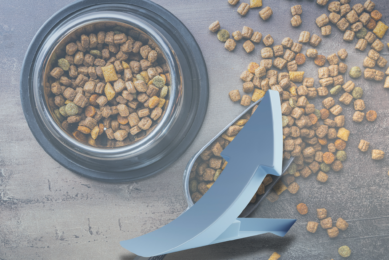Impact of pre- and probiotics on dogs’ health

As of 2024, there are approximately 470 million pet dogs in the world. Dog owners pay special attention to food ingredients and quality to improve the health and welfare of their dogs. This article discusses the impact of dietary prebiotics and probiotics on dogs’ health.
Natural feed additives such as prebiotics and probiotics in dog food improve digestibility, maintain, and stabilise beneficial microflora in the gut, reduce the prevalence of bacterial infections and promote gut health.
Overview of the most common prebiotics in dog food
Prebiotics are non-digestible food ingredients that selectively alter gut microbial populations, thus preventing pathogenic invasion and improving host health. Here you’ll find an overview of several prebiotics which could benefit dogs’ health and welfare.
Fructans: the most common prebiotics, are highly digestible substrates that stimulate the population of bifidobacteria in the colon. In addition to the production of bacteriocins, acetate and lactate produced from bifidobacteria decrease luminal pH, creating an unfavourable environment for many pathogens. Furthermore, fructans provide additional energy supply for gut microbiota.
Mannanoligosaccharides: which are moderately fermentable, positively influence gut microbial populations and immune capacity. In addition, mannanoligosaccharides are promising natural protective agents with antimutagenic and antioxidative activities.
Xylo-oligosaccharides: promote beneficial gut microbiota, prevent the adhesion of harmful bacteria to the gut tract, improve the immune system function, promote the digestion and utilisation of nutrients, and improve antioxidant capacity.
Chitosan oligosaccharides: have anti-bacterial, anti-tumour, and antioxidant functions, regulate gut microecological environment, improve the digestion and absorption of nutrients, increase placental amino acid transport capacity and improve immune system function.
Fructo-oligosaccharides: promote the abundance of beneficial gut bacteria, inhibit the growth and reproduction of harmful bacteria, increase the digestion and absorption of nutrients, improve the microecological environment and immune system function, as well as dry matter and nitrogen digestibility, and relieve the oxidative stress in dogs.
Overview of most common probiotics in dog food
Probiotics are foods or supplements comprised of live microorganisms that maintain or improve the normal microflora in the body. Here you’ll find an overview of the most common probiotics added to dog food to benefit dogs’ health.
Supplementation of Enterococcus faecium reduces the faecal count of Clostridium spp. in healthy dogs.
Lactobacillus animalis administration increases the abundance of Lactobacillus and reduces the abundance of Clostridium perfringens and enterococci and the level of lactic acid in faecal cultures.
Dietary supplementation of Bacillus amyloliquefaciens reduces the pathogenic clostridia count without influencing food digestibility in healthy dogs.
Feeding Queso Blanco cheese containing Bifidobacterium longum improves gut microbiota and short chain fatty acids level such as acetic and propionic acid and reduces the Enterobacteriaceae, Collinesella, Blautia, Fusobacterium and Clostridium count in dogs.
A probiotic feed additive comprising Lactobacillus casei Zhang, Lactobacillus plantarum, and Bifidobacterium animalis increases the load of Lactobacillus spp. and Faecalibacterium prausnitzii but decreases the abundance of Sutterella stercoricanisin and Escherichia
coli in the dogs’ faeces.
Kefir, a probiotic dairy product, improves gut heath by reducing the load of harmful bacteria such as Fusobacteria, Clostridiaceae, Fusobacteriaceae, Ruminococcaceae, and increasing the abundance of beneficial bacteria such as Sutterellaceae, Prevotellaceae, and Selenomonadaceae.
Bacillus subtilis and Bacillus licheniformis administration improve faecal consistency and reduce the faecal odour in dogs.
Lactobacillus acidophilus supplementation maintains the faecal moisture content and improves gut health.
Supplementation of Lactobacillus fermentum increases the faecal count of lactobacilli and enterococci, the serum level of total lipid and total protein and the faecal concentration of butyric, formic, succinic and valeric acid. On the other hand, Lactobacillus fermentum administration reduces the serum glucose level and faecal count of clostridia,
Aeromonas spp., E. coli and Pseudomonas spp. in healthy dogs.
Concluding remarks
Prebiotics and probiotics are natural feed additives with various beneficial impacts on dogs’ gut health. The protective effects of probiotic and prebiotic supplements depend on the strain, dose, duration of the intervention and combinations with other feed additives. This is why further studies are required to explore the beneficial implications of probiotics and prebiotics at a broader level, and to find effective probiotics and prebiotics doses and combinations that will improve gut health and overall health in dogs.











